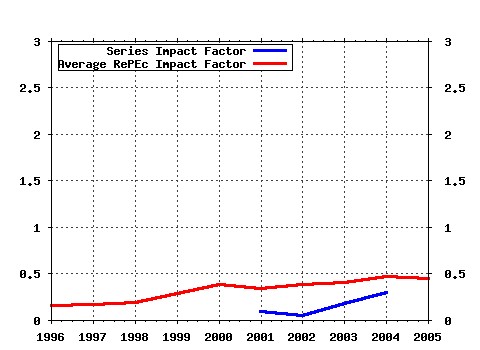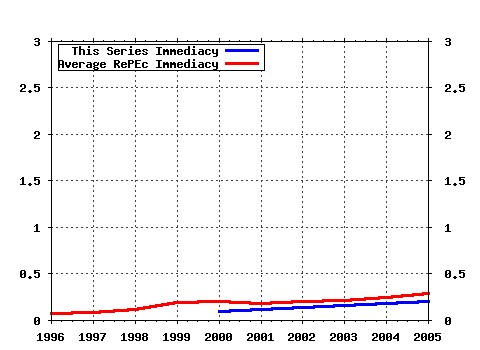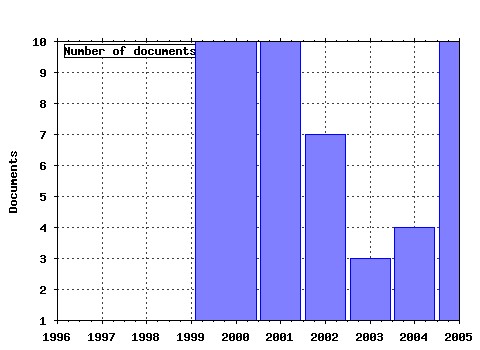
|
|
||||||||||||||||||||||||||||||||||||||||||||||||||||||||||||||||||||||||||||||||||||||||||||||||||||||||||||||||||||||||||||||||||||||||
International Food Policy Research Institute (IFPRI) / Working papers Raw citation data, Impact Factor, Immediacy Index, Published documents, Citations received, , Most cited papers , Latest citations and documents published in this series in EconPapers.
Most cited documents in this series: (1) RePEc:fpr:worpps:41 Who knows, who cares?: determinants of enactment, awareness and compliance with community natural resource management (2005). (2) RePEc:fpr:worpps:22 Legal pluralism and dynamic property rights: (2002). (3) RePEc:fpr:worpps:42 Localizing demand and supply of environmental services: interactions with property rights, collective action and the welfare of the poor (2005). (4) RePEc:fpr:worpps:59 Gender, social capital and information exchange in rural Uganda: (2006). (5) RePEc:fpr:worpps:21 Land redistribution, tenure insecurity, and intensity of production: a study of farm households in southern Ethiopia (2001). (6) RePEc:fpr:worpps:11 Collective action, property rights, and devolution of natural resource management: exchange of knowledge and implications for policy (2000). (7) RePEc:fpr:worpps:70 The role of public-private partnerships and collective action in ensuring smallholder participation in high value fruit and vegetable supply chains: (2007). (8) RePEc:fpr:worpps:43 Initiatives for rural development through collective action: the case of household participation in group activities in the highlands of Central Kenya (2005). (9) RePEc:fpr:worpps:8 CAPRi technical workshop on Watershed Management Institutions: a summary paper (2000). (10) RePEc:fpr:worpps:6 Land tenure and the adoption of agricultural technology in Haiti: (2000). (11) RePEc:fpr:worpps:29 In pursuit of comparable concepts and data about collective action: (2003). (12) RePEc:fpr:worpps:58 Gender differences in mobilization for collective action: case studies of villages in Northern Nigeria (2006). (13) RePEc:fpr:worpps:53 Decentralization and environmental conservation: gender effects from participation in joint forest management (2006). (14) RePEc:fpr:worpps:17 Evaluating watershed management projects: (2001). (15) RePEc:fpr:worpps:9 The role of tenure in the management of trees at the community level: theoretical and empirical analyses from Uganda and Malawi (2000). (16) RePEc:fpr:worpps:4 Land tenurial systems and the adoption of Mucuna planted fallow in the derived savannas of West Africa: (2000). (17) RePEc:fpr:worpps:54 Improving the effectiveness of collective action: sharing experiences from community forestry in Nepal (2006). (18) RePEc:fpr:worpps:2 Assessing the relationships between property rights and technology adoption in smallholder agriculture: a review of issues and empirical methods (2000). Latest citations received in: | 2005 | 2004 | 2003 | 2002 Latest citations received in: 2005 (1) RePEc:fpr:worpps:42 Localizing demand and supply of environmental services: interactions with property rights, collective action and the welfare of the poor (2005). International Food Policy Research Institute (IFPRI) / Working papers (2) RePEc:fpr:worpps:43 Initiatives for rural development through collective action: the case of household participation in group activities in the highlands of Central Kenya (2005). International Food Policy Research Institute (IFPRI) / Working papers Latest citations received in: 2004 Latest citations received in: 2003 Latest citations received in: 2002 Warning!! This is still an experimental service. The results of this service should be interpreted with care, especially in research assessment exercises. The processing of documents is automatic. There still are errors and omissions in the identification of references. We are working to improve the software to increase the accuracy of the results. Source data used to compute the impact factor of RePEc series. |



